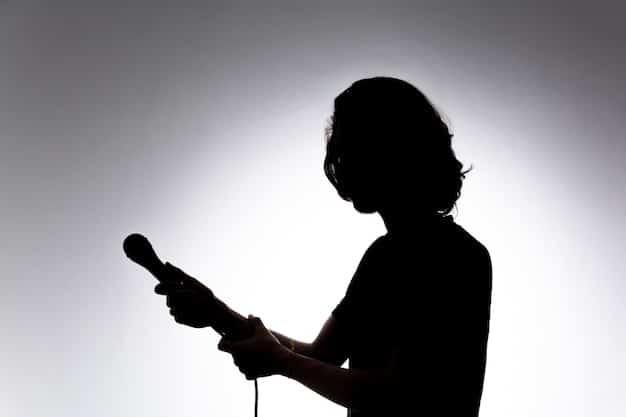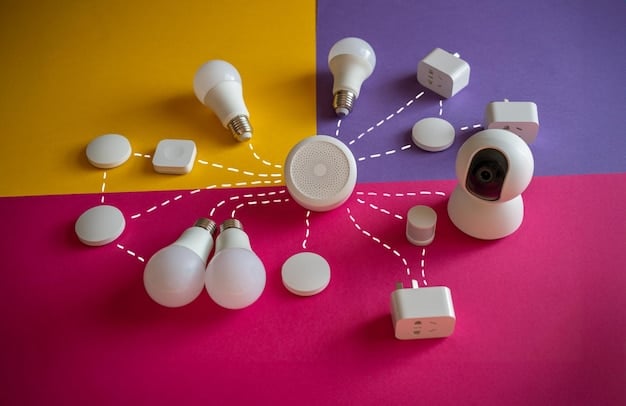DMCA Updates: What Podcasters Must Know in 3 Months

The latest Digital Millennium Copyright Act (DMCA) guidelines are set to significantly impact US podcasters within the next three months, primarily by tightening content usage regulations and increasing the onus on creators to ensure copyright compliance, potentially leading to enhanced scrutiny and new intellectual property challenges.
The landscape of digital content creation is constantly evolving, and for podcasters, staying abreast of legal and regulatory changes is paramount. As we approach 2025, a critical update to the Digital Millennium Copyright Act (DMCA) Guidelines is anticipated to send ripples through the US podcast industry, demanding immediate attention and strategic adjustments from creators nationwide. What do these changes entail, and how will they shape the next three months for those behind the microphones?
Understanding the Evolving DMCA Landscape
The Digital Millennium Copyright Act (DMCA), enacted in 1998, was a landmark piece of legislation designed to protect copyright holders in the digital age. It established a framework for addressing online copyright infringement, notably through the “notice and takedown” system, which allows copyright owners to request the removal of infringing material from online platforms.
For over two decades, the DMCA has served as the backbone of copyright enforcement in the US digital space. However, the internet has undergone colossal transformations since its inception. The rise of user-generated content, streaming services, and, crucially, podcasting, has continually challenged the original act’s scope and efficacy. As technology advances and new content distribution models emerge, so too must the regulations designed to govern them.
Recent discussions and proposed guideline revisions aim to address these modern complexities, focusing on areas like fair use in automated content, accountability for platforms hosting user-generated material, and the speed of infringement resolution. These updates are a direct response to the dynamic nature of online content and the rapid proliferation of new media formats, including the ever-expanding podcast universe. Podcasters, who often rely on a blend of original content and external materials, find themselves at a crucial intersection of creativity and compliance, making a thorough understanding of these changes indispensable for the industry’s future.
The anticipation surrounding these new guidelines stems from a collective recognition that the current DMCA, while foundational, requires refinement to address contemporary challenges. Issues such as the rapid spread of unauthorized content, the difficulty in attribution for AI-generated works, and the varying interpretations of fair use across different platforms have spurred this legislative push. Podcasters, as primary content creators and often distributors through third-party platforms, are uniquely positioned to feel the immediate effects of these shifts.
Specifically, the new guidelines are expected to introduce more granular definitions of what constitutes “infringement” in a streaming context, potentially affecting how incidental music, sound bites, or even brief clips from other media are used. This increased specificity aims to reduce ambiguity but places a higher burden on podcasters to be vigilant about every element incorporated into their productions.
Key Areas of DMCA Revision for Content Creators
- Enhanced Scrutiny of Fair Use Claims: The new guidelines may introduce more stringent criteria for determining fair use, particularly for commercial podcasts, requiring clearer justification for using copyrighted material.
- Platform Accountability: Digital platforms hosting podcasts could face increased responsibility for policing content, potentially leading to more automated takedowns or stricter vetting processes before content goes live.
- Rights Holder Empowerment: Copyright holders might gain new tools or expedited processes to identify and request the removal of infringing content, speeding up the legal redress process.
These anticipated changes underscore the need for podcasters to proactively review their content creation workflows and ensure robust copyright compliance mechanisms are in place. The grace period of three months is not a time for complacency but rather an urgent window for education, adaptation, and potential legal consultation to mitigate future risks.
The underlying intent of these revisions is to foster a more equitable digital ecosystem where creators’ rights are better protected, while still allowing for innovation and free expression. However, the practical application of these guidelines will determine their true impact on the diverse podcasting community, from independent creators to large networks.
Ultimately, navigating the updated DMCA landscape will require a blend of legal awareness, technological savvy, and a commitment to ethical content creation. Podcasters who embrace this challenge proactively will be better positioned to thrive in the evolving digital audio environment.
Immediate Impacts on Content Creation and Licensing
The most immediate and tangible effect of the new DMCA guidelines for US podcasters will be on their content creation and licensing processes. Many podcasters, especially those operating independently, often navigate a complex web of artistic expression and legal boundaries, sometimes inadvertently infringing on copyrights.
With stricter guidelines and potentially increased enforcement, the casual inclusion of copyrighted music, sound effects, or even short audio clips from films or TV shows will carry greater risk. Podcasters who previously operated under a broad interpretation of fair use or simply weren’t aware of the nuances of copyright law will need to re-evaluate their practices. This could mean a significant shift in how episodes are produced, pushing creators towards licensed stock audio, royalty-free music libraries, or original compositions.
The licensing of third-party content will become not just a best practice, but a critical imperative. Many podcasters currently rely on platforms that may offer some level of DMCA protection, but these new guidelines could transfer more of the responsibility directly to the creator. This shift implies a need for greater diligence in obtaining explicit licenses or written permissions for any non-original content used.
Furthermore, interviews and discussions that involve playing snippets of copyrighted material (e.g., a news report, a song excerpt, or a movie quote) will require careful consideration. Podcasters will need to determine if their usage truly falls under valid exceptions like commentary, criticism, or parody, rather than simply incidental use. The line between these categories can be nuanced, and the updated guidelines are expected to provide more specific interpretations, which may narrow the scope of what was previously considered acceptable.
The potential for automated content identification systems to become more prevalent and sensitive is also a concern. These systems, employed by platforms, can flag and potentially remove content even for brief uses of copyrighted material, leading to disruptions in content availability and potential strikes against the podcaster’s account. This necessitates a preventative approach, where content is vetted for copyright compliance before publication, rather than waiting for a takedown notice.
Practical Steps for Podcasters in the Next 3 Months
- Audit Existing Content: Review previously published episodes for any potentially infringing material. While not a mandate, proactive removal of problematic content can prevent future issues.
- Source Royalty-Free or Licensed Audio: Develop a robust library of legally sourced music, sound effects, and voice-overs. Platforms exist that offer vast collections under various licensing agreements.
- Educate Your Team: Ensure all contributors, editors, and hosts understand the updated copyright guidelines and the importance of compliance in every stage of production.
For podcasters producing content that heavily relies on commentary or parody, which traditionally falls under fair use, a deeper understanding of the updated guidelines’ specific provisions will be crucial. Documentation of how copyrighted material is transformed or serves as a critical part of the commentary will become more important than ever. This proactive approach to content creation, rooted in a strong understanding of intellectual property rights, will be vital for mitigating risks and ensuring the continued flow of engaging audio content.

Platform Accountability and Enforcement Mechanisms
The shift in DMCA guidelines isn’t solely about policing podcasters; it also places a significant spotlight on the platforms that host and distribute podcasts. Traditionally, platforms have enjoyed broad immunity from copyright infringement claims under the DMCA’s “safe harbor” provisions, provided they promptly respond to takedown notices.
However, emerging discussions suggest that the new guidelines may introduce greater accountability for these platforms. This could manifest in several ways: increased pressure to implement more sophisticated content identification technologies, proactive monitoring of uploaded content, or even a revised definition of what constitutes a “knowing infringement” by a platform. Such changes could compel platforms to invest more heavily in AI-driven content analysis tools, which, while efficient, may also lead to a higher rate of automated takedowns, sometimes erroneously.
For podcasters, this heightened platform accountability has a dual edge. On one hand, it could mean faster removal of content that infringes upon their own copyrights, offering better protection for their original work. On the other hand, it could lead to quicker action against their own content if it is flagged, even if they believe their use falls under fair use. This necessitates a more robust appeals process for creators, as well as a clear understanding of each platform’s specific content policies, which may vary as they adapt to the new guidelines.
The next three months will likely see platforms announcing their updated terms of service, content submission policies, and potentially new technological implementations designed to comply with these stricter rules. Podcasters need to pay close attention to these announcements as they will directly impact how and what they can upload. It’s not out of the realm of possibility for platforms to introduce more rigorous vetting processes or even pre-screening mechanisms for new content, especially from creators with a history of copyright claims.
Potential Platform Reactions
- Automated Content Scanning: Platforms might deploy or enhance AI tools to automatically detect copyrighted music or audio in uploaded podcast episodes.
- Stricter Upload Requirements: New forms or declarations might be required from podcasters confirming they have rights to all content.
- Revised Takedown Procedures: The notice and takedown process could become faster, or platforms might introduce a multi-strike system for repeat infringers.
Navigating these evolving platform policies will require constant vigilance. Podcasters should consider maintaining clear records of all licensing agreements and permissions to expedite any appeals process if their content is mistakenly flagged. The relationship between platforms and creators is dynamic, and these DMCA updates are poised to recalibrate it, foregrounding compliance and intellectual property adherence.
The Fair Use Doctrine: Reconciling Creativity with Compliance
The fair use doctrine, a cornerstone of US copyright law, allows for the limited use of copyrighted material without permission for purposes such as criticism, commentary, news reporting, teaching, scholarship, or research. It’s a principles-based defense that balances copyright holders’ rights with the public interest in creative expression and the dissemination of information. For many podcasters, especially those in analysis, commentary, or review, fair use is a vital tool.
The challenge, however, lies in its often subjective interpretation. What one party considers fair use, another might deem infringement. The new DMCA guidelines are expected to bring greater clarity, but potentially also greater restrictions, to this doctrine in the context of digital audio. This means that podcasters can no longer rely on a loose understanding of fair use; they must actively demonstrate how their use of copyrighted material aligns with the four factors of fair use:
- Purpose and character of the use: Is it commercial or non-profit educational? Is it transformative (i.e., does it add new meaning or purpose)?
- Nature of the copyrighted work: Is the original work factual or creative?
- Amount and substantiality of the portion used: How much of the copyrighted work was used, and was it the “heart” of the work?
- Effect of the use upon the potential market for or value of the copyrighted work: Does the use harm the market for the original work?
For podcasters, this means providing clear context for any copyrighted material incorporated into an episode. If a music clip is used, it should be for critical analysis, not just background ambiance. If a news report is played, it should be followed by substantial commentary or discussion that transforms its original purpose. Simply stating “this is fair use” will likely not suffice; demonstrable transformation and clear commentary will be key.
The upcoming three months are a critical period for podcasters to re-evaluate their understanding and application of fair use. Legal counsel may become a more common necessity for complex cases, guiding creators on how to robustly defend their fair use claims or, alternatively, when to seek explicit licenses. The goal is to move from an intuitive application of fair use to a deliberate, defendable one.
Strategies for Strengthening Fair Use Claims
- Ensure Transformative Use: Actively integrate copyrighted material with original commentary, analysis, or new creative expression that changes its original purpose.
- Attribute Clearly: Always credit the original source, even if relying on fair use, as this demonstrates respect for the creator and potentially strengthens your defense.
- Document Your Intent: Keep internal notes or records explaining why a particular piece of copyrighted material was used and how it fulfills the criteria for fair use.
The future of fair use in podcasting hinges on both the specifics of the new guidelines and the precedent set by future enforcement actions. Podcasters who proactively adapt and ensure their practices align with a more rigorous interpretation of fair use will be better equipped to navigate this evolving legal terrain, safeguarding their creative freedom while respecting intellectual property rights.
Proactive Measures Podcasters Must Take Now
Given the imminent changes to the DMCA guidelines, US podcasters have a narrow window—the next three months—to implement proactive measures that will safeguard their content and ensure compliance. This isn’t just about avoiding penalties; it’s about building a sustainable and legally sound foundation for their creative work.
The first critical step involves a comprehensive legal review of current and past content. While daunting, understanding potential vulnerabilities is crucial. This could involve consulting with an intellectual property lawyer specializing in digital media. For many independent podcasters, this may seem like an expensive hurdle, but the cost of potential infringement claims or takedowns could be far greater.
Secondly, investing in robust content licensing and copyright management tools is no longer optional. This includes exploring reputable stock music and sound effect libraries that offer clear and comprehensive licensing terms suitable for podcast distribution. Some services cater specifically to podcasters, offering subscriptions that cover a wide range of audio assets. Developing a strict internal policy for content sourcing, ensuring that every piece of external audio has a verifiable license or falls clearly under fair use, is paramount.
Thirdly, podcasters should consider diversifying their distribution channels and understanding each platform’s specific copyright enforcement mechanisms. While the DMCA provides a federal framework, individual platforms often have their own terms of service that may impose stricter requirements. Having content backed up and understanding the appeal process for each platform becomes vital for business continuity.
Essential Action Points for Podcasters
- Legal Consultation: Seek advice from an IP lawyer to understand specific risks and ensure compliance with the updated DMCA.
- Content Audit & Licensing: Review all existing and planned content for copyrighted material. Prioritize acquiring appropriate licenses for all third-party media.
- Develop Internal Protocols: Establish clear guidelines for content creation, review, and approval within your podcast team, ensuring all members understand and adhere to copyright best practices.
- Stay Informed: Continuously monitor official announcements from the US Copyright Office, industry organizations, and major podcast platforms regarding DMCA implementation.
Furthermore, networking with other podcasters and industry associations can provide valuable insights and shared learning experiences. Collective resources and discussions around compliance can help demystify the legal jargon and offer practical solutions. The next three months are not just about reacting to change, but about actively shaping a more responsible and resilient podcasting ecosystem where creativity flourishes within legal boundaries.
Future Implications and Long-Term Strategies
Looking beyond the immediate three-month horizon, the new DMCA guidelines are poised to have profound and long-lasting implications for the US podcast industry. These changes are not merely a temporary hurdle but represent a significant shift in the operational landscape, demanding long-term strategic adjustments from podcasters.
One major implication is the potential for increased market consolidation. Larger podcast networks, with more resources for legal counsel, content licensing, and sophisticated compliance infrastructure, may find it easier to adapt to the new regulatory environment. This could, in turn, make it more challenging for independent podcasters to compete, unless they embrace creative and cost-effective solutions for legal compliance.
Another long-term impact could be a greater emphasis on original content creation. As the risks associated with using third-party copyrighted material rise, podcasters may be incentivized to produce more of their own music, sound effects, and unique audio elements. This could spur innovation within the industry, leading to more original and distinct audio experiences, but also potentially increasing production costs and time for independent creators.
The role of artificial intelligence (AI) in content creation and copyright enforcement will also continue to evolve. While AI can help identify copyrighted material, it also presents novel challenges, particularly regarding the copyright ownership of AI-generated content. Future iterations of DMCA guidelines might need to address these emerging complexities, creating a continuously shifting legal landscape.
Furthermore, expect to see the development of new tools and services specifically designed to aid podcasters with copyright compliance. This could include platforms offering advanced content scanning services, specialized legal templates, or streamlined licensing marketplaces. Podcasters who embrace these technological solutions will be better positioned for long-term success.
Long-Term Adaptations for Sustainable Podcasting
- Foster Originality: Prioritize creating unique audio elements, music, and content to reduce reliance on third-party licenses.
- Build a Legal Foundation: For serious podcasters, establishing a relationship with an intellectual property lawyer for ongoing advice and contract review is a valuable investment.
- Advocate for Creator Rights: Engage with industry groups and legal reform efforts to ensure podcasters’ perspectives are considered in future policy discussions.
- Diversify Revenue Streams: Reduce dependence on ad revenue tied to platform policies by exploring direct listener support, merchandise, or live events.
Ultimately, the new DMCA guidelines are a catalyst for the podcast industry to mature and professionalize in its approach to intellectual property. While the immediate three months will be focused on adaptation, the long-term future will be shaped by how podcasters strategically integrate legal awareness into their creative process, ensuring both compliance and sustained innovation in the dynamic world of audio content.
Best Practices for US Podcasters Moving Forward
As the US podcast industry grapples with the impending changes to the DMCA guidelines, adopting a forward-thinking approach rooted in best practices is essential for long-term success and legal safety. This involves more than just reacting to new rules; it requires integrating copyright awareness into every facet of podcast production and distribution.
One fundamental best practice is to always operate under the assumption that any content not created by you or explicitly licensed to you is copyrighted. This conservative stance can prevent accidental infringement. Before including any music, sound clips, or dialogue from external sources, confirm their origin and rights status. When in doubt, seek alternative, royalty-free options or obtain explicit permission from the copyright holder.
Secondly, meticulous record-keeping is no longer optional. Maintain clear, organized records of all licenses, permissions, and agreements related to third-party content. This documentation will be invaluable if a copyright claim is ever raised, allowing you to quickly demonstrate your right to use the material. This might involve creating a digital library of licenses or integrating copyright management notes into your production workflow.
Thirdly, cultivate a culture of copyright awareness within your podcasting team, if applicable. From scriptwriters to audio editors, everyone involved in content creation should understand the basics of copyright law and the importance of compliance. Regular training sessions or internal guidelines can help reinforce these principles and ensure consistency across all episodes.
Additionally, consider the geographical reach of your podcast. While the DMCA is a US law, podcasts are inherently global. Be mindful that content legal in the US may not be so in other territories, and vice versa. While these guidelines focus on US podcasters, a broader awareness of international copyright norms can prevent future complications if your audience extends beyond US borders.
Strategic Best Practices for Podcasts
- Prioritize Originality: Whenever possible, create your own music, sound effects, and voice-overs to avoid licensing complexities.
- Verify All External Content: Never use a sound byte or music track without confirming its copyright status and obtaining necessary permissions.
- Invest in Education: Regularly update your knowledge of copyright law and fair use, attending webinars or engaging with legal resources.
- Engage with Your Platform: Understand your hosting platform’s specific DMCA policies and leverage their support resources.
Finally, engage with the podcasting community and industry associations. These groups often serve as vital hubs for sharing information, discussing challenges, and advocating for creators’ rights in policy discussions. Being part of this collective dialogue can help shape a more favorable regulatory environment for podcasters in the long run. By embracing these best practices, podcasters can navigate the evolving DMCA landscape with confidence, ensuring their creative output remains both innovative and legally sound.
Preparing for the Post-DMCA Update Ecosystem
As the podcast industry gears up for the new DMCA guideline implementation, preparing for the post-update ecosystem means more than just adhering to new rules; it involves anticipating shifts in production, consumption, and the overall business model of podcasting. This foresight allows podcasters to not only mitigate risks but also identify new opportunities in a transformed legal landscape.
One anticipated shift is an increased demand for licensed content libraries and specialized legal services for audio creators. Companies that can provide clear, comprehensive, and affordable licensing solutions for music, sound effects, and archival audio will likely see a surge in demand. Similarly, legal firms specializing in intellectual property and digital media will become even more indispensable resources for podcasters of all sizes.
The post-DMCA update ecosystem might also see a change in content diversification. Podcasters traditionally reliant on content forms that frequently brush against copyright boundaries (e.g., extensive use of pop culture clips without significant commentary) may pivot towards formats that are inherently less susceptible to infringement claims. This could include a greater emphasis on interview-based shows, original storytelling, educational content, or unscripted discussions that rely almost entirely on original speech.
Furthermore, consumer awareness of copyright issues might increase. As takedown notices become more frequent or widely reported, listeners may also become more discerning about the legality of the content they consume. This could subtly influence audience preferences, favoring podcasts that demonstrate clear adherence to legal standards and ethical content sourcing.
Finally, technology will continue to play a pivotal role. Advanced AI and blockchain technologies could, in the long term, offer more robust solutions for copyright management, attribution, and licensing. Podcasters who stay informed about these technological advancements and are open to adopting new tools will find themselves at an advantage in the continually evolving digital audio space.
Anticipating Ecosystem Shifts
- Rise of Specialized Services: Expect more platforms and businesses to emerge, offering tailored copyright compliance solutions for podcasters.
- Content Strategy Evolution: Podcasters may shift production focus towards formats with lower copyright risks.
- Increased Legal Literacy: A heightened overall legal awareness within the podcasting community.
- Technological Innovation: New tech solutions for copyright management and content verification are likely to develop.
The immediate three months are crucial for adaptation, but the true impact of these DMCA guidelines will be felt in the long-term shaping of the podcast industry. Those who proactively prepare for these ecosystem shifts, prioritize legal compliance, and embrace innovation will be well-positioned to thrive in the new era of digital audio content creation.
| Key Area | Brief Impact |
|---|---|
| ⚖️ Content Licensing | Stricter rules for copyrighted material use, increasing need for explicit licenses or royalty-free alternatives. |
| 🛡️ Platform Liability | Platforms face increased responsibility, potentially leading to more automated takedowns and rigorous content vetting. |
| 💡 Fair Use Interpretation | Fair use claims will require stronger justification, emphasizing transformative use and clear commentary over incidental inclusion. |
| 🚀 Proactive Measures | Immediate content audits, legal consultations, and internal protocol development are critical for podcaster readiness. |
Frequently Asked Questions
▼
The DMCA is a US copyright law from 1998 designed to address digital copyright infringement. It provides a legal framework for copyright holders to request the removal of infringing content from online platforms, offering “safe harbor” protection to platforms that comply promptly with takedown notices.
▼
The updated guidelines are expected to tighten rules around content usage, particularly for music and sound clips, placing greater responsibility on podcasters to ensure proper licensing or robust fair use defense, potentially leading to more frequent takedowns if not compliant.
▼
Fair use allows limited use of copyrighted material without permission for purposes like criticism or commentary. The new guidelines may require podcasters to more clearly demonstrate how their use is “transformative” and adds new meaning, rather than being merely incidental or decorative.
▼
Podcasters should conduct a content audit, seek legal counsel regarding their use of copyrighted material, invest in proper licensing for third-party content, and educate their teams on updated compliance protocols to mitigate risks.
▼
Yes, platforms are likely to implement stricter content policies, potentially including enhanced automated scanning for copyrighted material and revised takedown procedures, to comply with increased accountability under the updated DMCA guidelines.
Conclusion
The upcoming revisions to the Digital Millennium Copyright Act represent a pivotal moment for US podcasters. Within the next three months, understanding and adapting to these new guidelines will not just be a legal necessity but a strategic advantage. By prioritizing diligent content creation, robust licensing practices, and a proactive approach to intellectual property, podcasters can navigate this evolving legal landscape with confidence, ensuring their creative voices continue to thrive while fully respecting the rights of all content creators.





